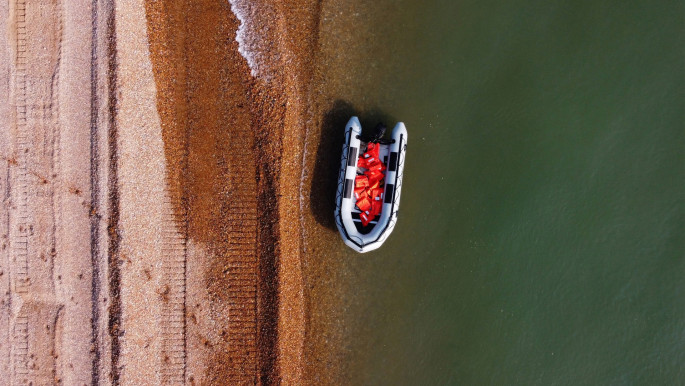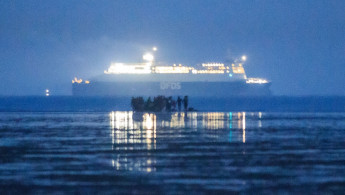For survivors of Italy's 2013 migrant drowning tragedy, justice is a long time coming
Leopoldo Manna and Luca Licciardi stood trial last Thursday for delaying the rescue of 400 migrants and causing the death of over 200.
The investigation "is important to identify remedies to the victims, potential procedural flaws and prevent repetition in the future," an OHCHR representative told The New Arab in a statement.
But, aside from its legal implications, the stakes are high for the families of the victims, who have fought long and hard to have their story heard in court.
Refaat Hazima, a Syrian hairdresser who lost his two children at sea, told The New Arab all he wanted was to be able to hug Ahmad, 11, and Mohammad, 8, who were among the 60 children lost at sea. "Since I can't have them back, I at least want justice," he said.
According to some estimates, 268 people drowned on 11 October, 2013, in the stretch of sea between Libya and Italy. Hazima, who owned a barber shop in Aleppo before the war in Syria, is part of a group of survivors who succeeded in filing a legal suit on the grounds that Italy had failed to take appropriate measures to save their relatives. The Criminal Court in Rome is scheduled to reach a verdict by the end of the year.
 |
The stakes are high for the families of the victims, who have fought long and hard to have their story heard in court |  |
The hearing, as well as the UN report released on Wednesday, have pieced together an accurate timeline of the tragedy. The reconstruction begins on 10 October 2013, as a large group – mainly composed of Syrian refugees fleeing their war-torn homeland – huddled around a fishing vessel anchored outside the port of Zuwarah, Libya.
Around 400 passengers set out to sea at around 1am. A few hours after the vessel had set off, it was shot at by a boat flying a Berber flag. As water gushed through the punctured hull and the vessel sailed towards European shores, Mohammad Jammo, a Syrian doctor with good knowledge of English, called the Italian number for emergencies at sea. It was around 11am.
The vessel was going to sink, he told the emergency operator, adding that there were many children on board. He forwarded the geographical coordinates of the vessel and waited for the rescue team. Two hours later, with no help in sight, he called the Italian Coast Guard again. "We are dying, please!" he said, according to a recording of the phone call published by Italian media.
 |
|
| Read more: Migration in post-Brexit Britain: How will refugees and asylum seekers be affected? |
The operator explained that their vessel was in the Maltese search and rescue zone and gave Jammo the phone number for Malta's Rescue Coordination Centre. "Malta, Sir. You have to call Malta," the operator told a desperate Jammo.
At 3.37pm an Italian Air Force officer called the Command of the Italian Navy to receive instructions as to what orders to impart to the Italian rescue vessel, Libra, which was closest to the boat in distress.
An hour later, Malta requested Italy to put the Libra at the disposal of the rescue operation. Rome's rescue centre denied the authorisation and invited Malta to request the intervention of commercial ships.
As the two sides squabbled over who should take responsibility, the vessel capsized. It was only at 5pm that the Libra was ordered to intervene and approach the vessel in distress.
The OHCHR found that Italian and Maltese rescue centres had tried to deflect responsibility for the rescue operation onto each another instead of intervening promptly. Rome had called at 1pm to inform the Maltese authorities of the vessel and hand over the operation but had failed to provide the exact location of the ship.
Phone records reveal that the Libra was ordered to move further away from the vessel in distress to avoid taking charge of the rescue operation.
"Had the Italian authorities immediately directed its naval ship and coast guard boats after the distress calls, the rescue would have reached the vessel at the latest two hours before it sank," said UN committee member Helene Tigroudja.
 |
Had Italian authorities immediately directed its naval ship and coast guard boats after the distress calls, the rescue would have reached the vessel at the latest two hours before it sank |  |
Manna, an officer with the Coast Guard, and Licciardi, the commander of the Navy's Operating Room, were identified as the operators responsible for the delayed rescue.
Arturo Salerni, a lawyer representing some of the families, including Hazima's, told The New Arab it was paramount to ascertain whether "a criminal act was committed."
The defence of the officers has been based on the absence of proof that the people who died were on board of the vessel before it sunk. "The extent of the tragedy is clear, but those who claim to have had relatives on board of the vessel… it's all on the basis of their own declarations," Luca Cicaglia, a lawyer defending Manna, said in a hearing on 5 October.
 |
|
| Read more: Moria camp tragedy is a wake-up call for Europe's failed migration policy |
As "no ticket" was issued at the time of boarding, it would be impossible to establish from a legal standpoint who has died as a consequence, Cicaglia argued.
The Euro-Med Human Rights Monitor has welcomed the UN's report and called for a similar investigation into a shipwreck on 15 September 2014, when over 200 drowned off the Libyan coast.
Italy has witnessed multiple legal battles around the issue of migration – the most pressing being the trial against former Interior Minister Matteo Salvini – but the coronavirus pandemic and the country's dire economic conditions have replaced immigration as the main concerns for most Italians.
But the outcome of these trials will set a precedent, as thousands of migrants attempt to cross the Mediterranean each year in the hope of a fresh start in Europe.
Federica Marsi is a journalist based in Beirut, Lebanon. Follow her on Twitter @federica_marsi



![sudan women [getty] sudan women [getty]](/sites/default/files/styles/image_330x185/public/media/images/5019D7F4-52AF-4377-8A05-885D27476479.jpg?h=d1cb525d&itok=tKXV7r-W)